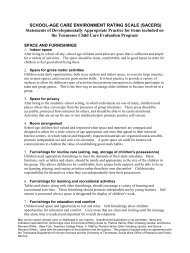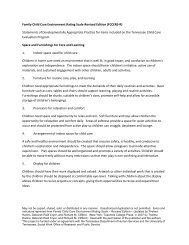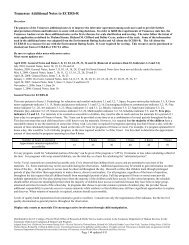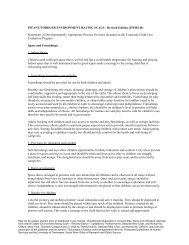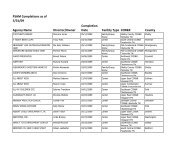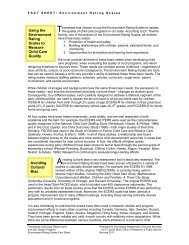ECERS-R - Star-Quality Program
ECERS-R - Star-Quality Program
ECERS-R - Star-Quality Program
Create successful ePaper yourself
Turn your PDF publications into a flip-book with our unique Google optimized e-Paper software.
7. Gross motor play<br />
Children need daily opportunities to exercise large muscles, run in open spaces, and practice gross<br />
motor skills. (Safety is always a number one priority.) Space to develop children’s large muscles<br />
through a variety of play experiences should be made safe by providing adequate cushioning for fall<br />
zones. All play equipment should be safe and effective monitoring should be implemented to teach<br />
children safe play behavior and to safeguard against accidents.<br />
8. Gross motor equipment<br />
Children need age appropriate stationary and portable equipment to promote a wide variety of skills<br />
that exercise large muscles while developing confidence and abilities. Equipment should be sound,<br />
sturdy, safe and accessible to children daily.<br />
PERSONAL CARE ROUTINES<br />
9. Greeting/Departing<br />
Parents and children need a warm, welcoming, and pleasant atmosphere to make the daily greeting and<br />
departing routine a happy one. Positive greetings help to promote the children’s self-esteem and<br />
create a welcoming environment for parents.<br />
10. Meals/Snacks<br />
Meals and snacks that follow USDA guidelines contribute to the health of children and provide a<br />
model for good nutritional habits for life-long practice. Proper hand washing along with careful food<br />
preparation teach children proper hygiene and promotes sanitary conditions.<br />
11. Nap/Rest<br />
Nap and/or rest time should be appropriately scheduled and supervised for the children in the group.<br />
Adequate separation of cots helps to prevent the spread of germs. Soft music or a soothing story helps<br />
to facilitate a peaceful rest time that is important in helping children to balance the day and renew their<br />
energy.<br />
12. Toileting/Diapering<br />
Young children need appropriate supervision of the toileting process in order to care for basic needs<br />
and to teach the importance of good health habits. The schedule should be individualized. Provisions,<br />
such as soap and steps near the sink, should be convenient and accessible so that children can wash<br />
hands after toileting; this promotes self-help skills and good personal hygiene. Diapering should<br />
always be managed in a manner that promotes safety and good health practices.<br />
May not be copied, shared, sold, or distributed in any manner. Unauthorized duplication is not permitted.<br />
Items and indicators reprinted from Early Childhood Environment Rating Scale – Revised Edition – Updated<br />
by Thelma Harms, Richard M. Clifford, and Debby Cryer. (New York: Teachers College Press, 2005 by<br />
Thelma Harms, Richard M. Clifford, and Debby Cryer.) Used with the permission of the publisher and the<br />
authors. This project is funded under an agreement with the Tennessee Department of Human Services<br />
and the University of Tennessee, Social Work Office of Research and Public Service.




